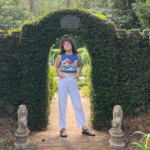 Whether championing the dry-rub brisket of his native Texas or sharing self-deprecating anecdotes from his MFA-daze at NYU, veteran blogger and recent volunteer Jose Araguz infuses the CR office with his characteristic humor and generous intelligence. “Sorry,” Jose will say after praising a sestina’s inevitable yet surprising end-words, “I’m easily excited.” We on the CR staff disagree; when it comes to assessing submissions, Jose displays a keen discernment—a quality everywhere apparent in his appreciation of the brief lyrics of Ana Blandiana (10.2). In fact, Jose’s installment of Why We Like It marks this blog’s first appreciation of any writing-in-translation featured in the magazine—an oversight Jose was enthusiastic to remedy.
Whether championing the dry-rub brisket of his native Texas or sharing self-deprecating anecdotes from his MFA-daze at NYU, veteran blogger and recent volunteer Jose Araguz infuses the CR office with his characteristic humor and generous intelligence. “Sorry,” Jose will say after praising a sestina’s inevitable yet surprising end-words, “I’m easily excited.” We on the CR staff disagree; when it comes to assessing submissions, Jose displays a keen discernment—a quality everywhere apparent in his appreciation of the brief lyrics of Ana Blandiana (10.2). In fact, Jose’s installment of Why We Like It marks this blog’s first appreciation of any writing-in-translation featured in the magazine—an oversight Jose was enthusiastic to remedy.
Jose Araguz: I have long been a champion of the short lyric. The poems of Ana Blandiana, as translated by Paul Scott Derrick and Viorica Patea, are marvelously complex examples. The two pieces that struck me in particular were “I’m Blinkered” and “Hourglass.”
“I’m Blinkered” begins: “I’m blinkered/ Like the eye of a horse,” setting a sardonic tone right off. The poem then explores the experience the title names, a state of seeing the reader quickly discovers is about not seeing, of being hindered, bothered to the point of not wanting to bother. “Don’t ask me,” says the speaker, “What trees and flowers/ I’ve found along the way.” Capable of both wit and gravity, this nuanced voice pulls the reader in until we are left, like the speaker, receiving “messages/ That [we] don’t understand in the clouds.” The poem is visceral in that it conveys the condition of being physically blinkered, but also expresses a kind of metaphysical ennui.
In “Hourglass,” the speaker contemplates how a grain of sand, stuck in the narrow passage between glass bulbs, “refuses to fall.” Because of the stuck grain, time has stopped: “Nothing moves.” Through this predicament, the speaker relays humor, then pushes forward into more serious territory. The poem ends with the declaration: “A dream of stopping/ On the road toward death/ Is almost the same as being dead.” Suddenly, the reader is moved from contemplating the grain of sand into being the grain of sand.
What does it mean to be stuck? Is dreaming a way of being stuck? What do we miss while “blinkered” by our daily thoughts? These questions are just some of the places I go when I read these poems. Whether grain of sand or the eye of a horse, Blandiana’s short lyrics find ways to transform her personal vision into accessible and meaningful poetry.











This is a very perceptive analysis of Blandiana’s poems.
https://www.facebook.com/AnaBlandianaPoet
You may want to find out more on Ana Blandiana’s life and work at this FBK I am writing on her.
She is a wonderful poet as great as Anna Akhmatova and I do hope that the English translations of her poems will make her world known. Her works have been translated into 24 languages. Her book of poems My Native Land A4 will come out at Bloodaxe in May 2014
Thank you so much for your feedback, Viorca! I agree with your comparison with Akhmatova. I just found out of some translations of her work happening in Spain. Let’s hope the word(s) keep getting out!